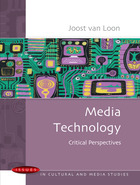Joost Van Loon: Media Technology: Critical Perspectives (2007)
Filed under book | Tags: · media, media theory, new media, technology

What are media? Why are more and more objects being turned into media? How do people interconnect with the media in structuring their everyday lives? In “Media Technology: Critical Perspectives,” Joost van Loon illustrates how throughout the course of society, different forms of media have helped to shape our perceptions, expectations and interpretations of reality.
Drawing on the work of media scholars such as Marshall McLuhan, Walter Benjamin, Roland Barthes and Raymond Williams, the author provides a theoretical analysis of the complexity of media processes. He urges the reader to challenge mainstream assumptions of media merely as instruments of communication, and shows how the matter, form, use and purpose of media technologies can affect content.
The book uses practical examples from both old and new media to help readers think through complex issues about the place of media. This helps to create a more innovative toolkit for understanding what media actually are and the basis for trying to make sense of what media actually do. It uses case studies and examples from television, radio, print, computer games and domestic appliances.
“Media Technology” is essential reading for undergraduate and postgraduate students on media, social theory and critical theory-related courses.
Publisher McGraw-Hill, 2007
ISBN 0335214460, 9780335214464
Length 174 pages
More info (publisher)
More info (google books)
Marshall McLuhan: Understanding Media: The Extensions of Man (1964–) [EN, SC, CZ, DE, CR]
Filed under book | Tags: · advertising, film, global village, history of technology, mass media, media technology, media theory, money, new media, phonograph, photography, print, radio, technology, telegraphy, telephone, television

“When first published, Marshall McLuhan’s Understanding Media made history with its radical view of the effects of electronic communications upon man and life in the twentieth century. In Terrence Gordon’s own words, “McLuhan is in full flight already in the introduction, challenging us to plunge with him into what he calls ‘the creative process of knowing.'” Much to the chagrin of his contemporary critics McLuhan’s preference was for a prose style that explored rather than explained. Probes, or aphorisms, were an indispensable tool with which he sought to prompt and prod the reader into an “understanding of how media operates” and to provoke reflection.
In the 1960s McLuhan’s theories aroused both wrath and admiration. It is intriguing to speculate what he might have to say 40 years later on subjects to which he devoted whole chapters such as Television, The Telephone, Weapons, Housing and Money. Today few would dispute that mass media have indeed decentralized modern living and turned the world into a global village.”
First published in 1964
With a new introduction by Lewis H. Lapham
Publisher The MIT Press, 1994
ISBN: 0262631598, 9780262631594
392 pages
Understanding Media: The Extensions of Man (English, 1964/1994, updated on 2019-2-27)
Poznavanje opštila: čovekovih produžetaka (Serbo-Croatian, trans. Slobodan Đorđević, 1971, added on 2015-12-21)
Jak rozumět médiím: Extenze člověka (Czech, trans. Miloš Calda, 1991, added on 2014-3-13)
Die magischen Kanäle: Understanding Media (German, trans. Meinrad Amann, 1992, added on 2013-11-22)
Razumijevanje medija (Croatian, trans. David Prpa, 2008, added on 2013-11-22)
Bakhtinian Perspectives on Language and Culture: Meaning in Language, Art and New Media (2004)
Filed under book | Tags: · language, language theory, new media

In this multi-disciplinary volume, comprising the work of several established scholars from different countries, central concepts associated with the work of the Bakhtin Circle are interrogated in relation to intellectual history, language theory and an understanding of new media. The book will prove an important resource for those interested in the ideas of the Bakhtin Circle, but also for those attempting to develop a coherent theoretical approach to language in use and problems of meaning production in new media.
Editors Finn Bostad, Craig Brandist, Lars Sigfred Evensen, Hege Charlotte Faber
Publisher Palgrave Macmillan, 2004
ISBN 140391690X, 9781403916907
Length 235 pages
More info (publisher)
More info (google books)

